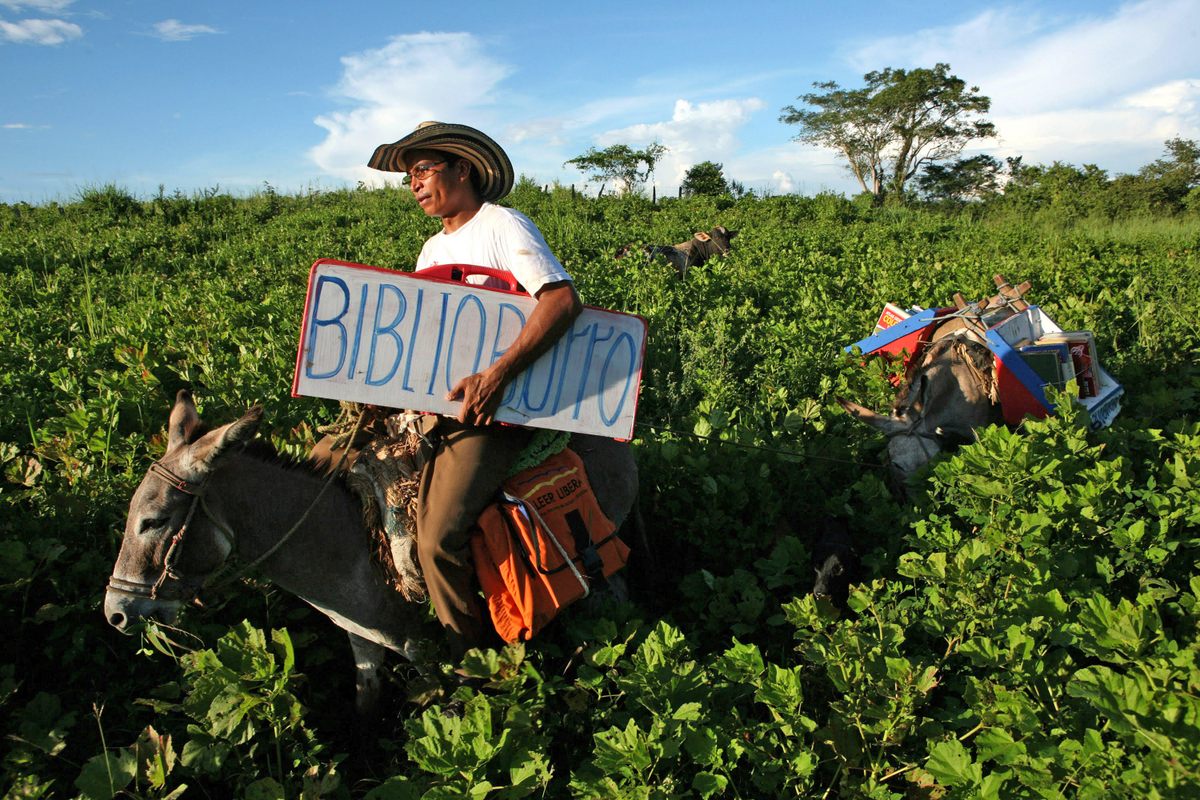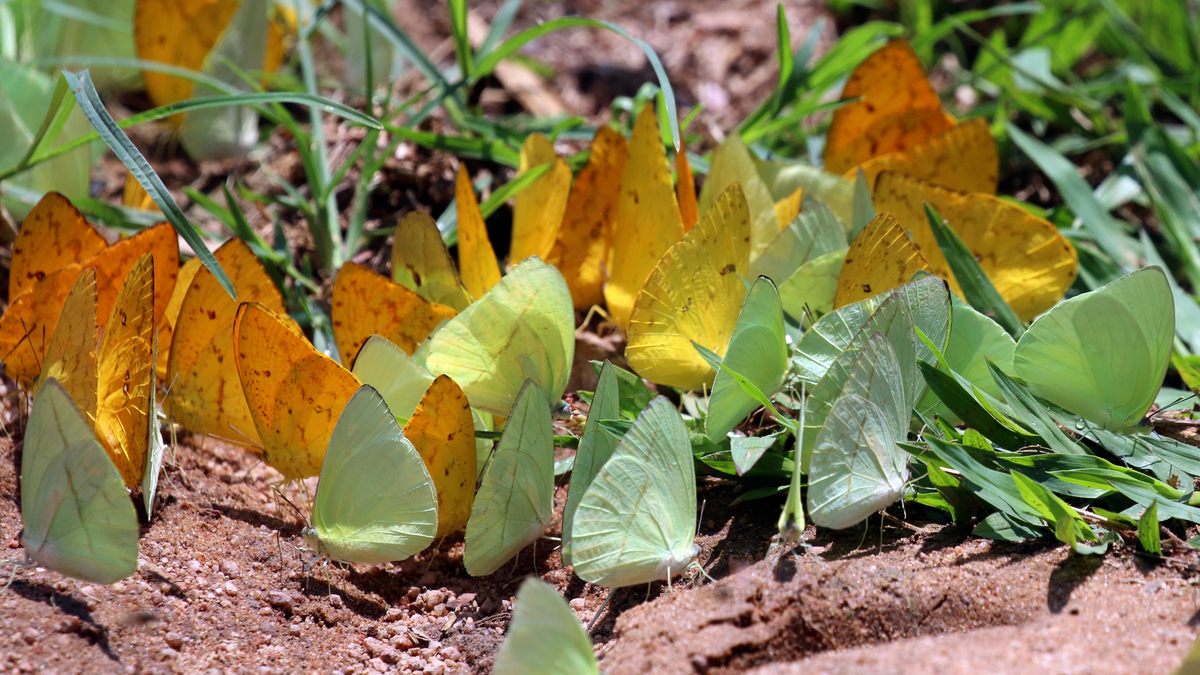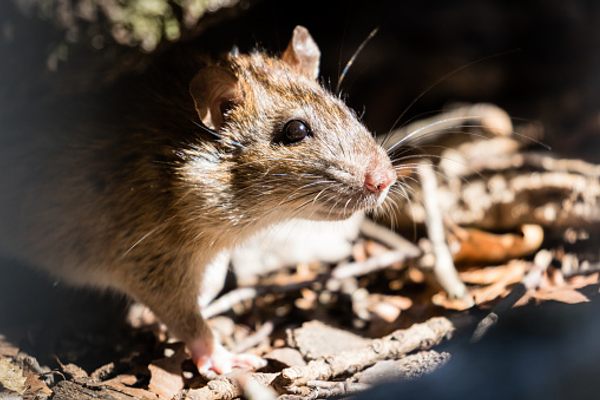Luis Soriano Had a Dream, Two Donkeys, and a Lot of Books
The schoolteacher’s long-running Biblioburro program delivers reading materials to children in Colombia.
Excerpted and adapted with permission from Jordan Salama’s Every Day the River Changes: Four Weeks Down the Magdalena, published November 2021 by Catapult Books. Copyright © 2021 by Jordan Salama.
Luis Soriano was born so premature that when he arrived into the world, everyone was sure that he would die.
He was born in 1972, in the very same Colombian village of La Gloria (Magdalena Department) where he grew up and made his life. His father was a cattle rancher, and his mother sold fruit and milk on the side of the road. They were hardworking campesino parents who emphasized to their many children the importance of an education over everything else.
Luis grew up playing in the rolling fields of the Magdalena valley. La Gloria was set inland from the river by about one hour, yet the river wielded great influence upon the town: It was built, in fact, during the golden age of river transport, when through travelers heading toward river ports like Mompox and Plato would inevitably stop in La Gloria for onward transportation, and when farmers could easily find vessels to transport their products far across Colombia. In town, it was said that the Magdalena dictated the rains and the floods of the nearby lowlands, which influenced the rains and the floods in La Gloria, and during droughts, the town felt the river’s pain. The river’s beaches and sandy islands yielded the yucca, plantains, and beans of the Caribbean diet—La Gloria is nearly 100 miles from the nearest Caribbean seaside town, but yes, its people will tell you, it is indeed a Caribbean place.

Raised in the countryside, Luis learned things from the land that people from the city never understood. In the hot, humid afternoons, a line of ants hurrying across the path meant that the skies were about to open and intense rains would fall and freshen the air; at night, the sudden silence of the frogs and the toads meant that another person was approaching in the darkness. From watching the birds, he gathered certain observations about their daily routines, like which of the trees the flocks of red-and-green macaws preferred for their nightly roosts and at what hours of the day the sirirí sang its lonely song. These were things that he learned from a very young age and carried with him throughout his life.
But Colombia’s escalating violence in the 1970s and ’80s meant that Luis would not be able to stay. When the paramilitaries and other criminal groups plagued La Gloria and the surrounding countryside, Luis’s parents sent him and his siblings to live with family in Valledupar, hours away. His life playing among the animals was replaced by the loud, gritty streets of a valley city.
By the time Luis finished high school and returned to La Gloria, he decided, maybe as a product of all of this learning and absorbing in his own life, that he wanted to become a schoolteacher. He got a job in a small, rural primary school in nearby Nueva Granada, where he taught reading and writing. At the same time, he completed a remote degree from the Universidad del Magdalena.
None of his students did any of their schoolwork or seemed to make any progress in the first few years, and Luis blamed himself for it. He thought he was a bad teacher, that he had misjudged his life’s purpose, all because the students just didn’t seem to be learning. He realized that many of the children, living on isolated farmsteads that were several miles along narrow dirt paths from the nearest school, couldn’t practice reading at home because they didn’t have access to books. A teacher with limited resources himself, he decided to do the only thing he could: bring his own books to them.
And so, before dawn one day in 1997, he took one of his donkeys and a stack of books and set off across the countryside. Covering several miles of difficult terrain, he stopped at the homes of each one of his students and read with them, before lending them the book and telling them he’d be back the next day to pick it up. And in this manner, he returned day after day, in the early hours of morning, well before school started, for he knew from experience that families living in the fields rose with the first song of the sirirí and the crows of roosters in the dark.
More than 20 years on, he hasn’t stopped. “At first, people saw me as nothing more than a half-insane teacher with some books and his donkey,” Luis liked to say. “Without realizing it at the time, I’d created the very same rural traveling library that the world now knows as the Biblioburro.”
Biblioburro started out with just seventy books, all of them Luis’s own, and only one donkey. He quickly added a second donkey, affixing wooden bookcases to both of their saddles for ease of transport, and named the two animals Alfa and Beto (alfabeto, alphabet in Spanish). He started extending and diversifying each day’s route to reach more children in the area. When the beloved Colombian national radio broadcaster Juan Gossaín got wind of the Biblioburro story in 2003 and shared it with his listeners, book donations from around the world started pouring in—today, Luis boasts a collection of more than 7,000 titles.

Yet for all the international attention, it remains a humble operation. When Luis sets off on a Biblioburro visit, he does it alone, quietly, with his two trusted donkeys. Often, he won’t encounter another person for hours as he makes his way across the rugged, lonesome terrain—an uncomfortable ride, and an even more arduous walk, beneath the merciless sun. But the children who live in these lonely places await the arrival of the Biblioburro and its stories with great fervor, running wide-eyed toward Alfa and Beto when they spot them on the horizon.
Perhaps, in the children he serves, Luis Soriano sees some part of himself. He sees that they can beat the odds—for while Luis has easily become the most famous person to ever come from La Gloria, at the moment of his birth, you would have been hard-pressed to find anyone who imagined he would have resurged from his situation as well as he did.
Except for one person, that is. As the story goes, his parents called upon an older woman, who was very respected in town, to come examine the child and give him her blessing. Minutes after Luis’s birth, she made her way over to the house and stood over him, looking his tiny body up and down, seeming to ponder whether he would be destined to live as long as she had. After several moments, she spoke. “This little one, he isn’t going to die” was what the old woman said (though who knows if she actually believed it herself). “He is going to grow up and become a doctor, and he will save this town.”
We’d gotten a late start that morning, for Luis Soriano’s motorcycle was broken, and he had to find a replacement part. I found him along the highway, bent over his old Yamaha outside a friend’s auto body shop, which was actually not much more than a wooden shed inhabited by several cats and one man.
“Doctor,” the man said, emerging from his cluttered shed after several minutes, and Luis looked up. He was not a doctor, despite the nickname that everyone had been calling him since his boyhood, but he did not think much of it. “You’re all set.”
“Gracias, amigo.”
Luis, who I noticed walked with a slight limp, wheeled his newly repaired motorcycle to the side of the road and gestured for me to hop on. La Gloria, a transit town, was a two-road village, built in the 1940s when a new highway created the only intersection that could be found for miles. He drove us 30 seconds around the corner to an unmarked yellow building, across from a noisy restaurant and an even noisier school. Around this corner he was not only known as “Doctor” but “Profe”—the school, a public school, was one he founded. The adjoining restaurant was his wife’s, where the smell of stews and frying meat drifted past men drinking sweating orange sodas in the shade. Without a word, Luis disappeared into the home for several minutes. Men with megaphones passed by in pickup trucks, hawking crates of tangy tamarillo fruit. A few feet further down the road from the house, the school, and the restaurant, I noticed a colorful mural under the shade of some trees that depicted a man, accompanied by two smiling donkeys, handing out books to children with outstretched arms.

The man from the mural came back out of the house just a few moments later, with two colorful wooden crates filled with stacks of children’s picture books. He hung each one from the back seat of the motorcycle, and we were off once more, back down the road that brought me to La Gloria in the first place. I wondered how far we might be going—on the way here from Mompox, nearly an hour passed without a trace of much of anything at all, aside from a few clusters of farmhouses amid the open, undulating pastures. The one where we eventually stopped, about a mile down a dirt road turnoff along the highway, was called Santa Isabel. We reached a tiny farmhouse that overlooked some pasturelands populated by several dozen cows. This was where he kept Alfa and Beto nowadays, Luis said, since the roadside in La Gloria was getting too busy with trucks and cars for the animals to graze in peace.
Luis called out toward the farmhouse as we pulled up, and a farmhand came outside. He took us to a burro that was tied to a tree beside the farmhouse, staring blankly into space.
“Where is la burra?” Luis asked, and I realized that this one was Beto. “Could you go fetch her for me?”
“Well, I don’t know…” The man trailed off.
“It’s just that”—Luis leaned in and lowered his voice, so as not to offend the donkey—“this guy walks too fast.”
The farmhand pointed toward the pastures behind the house. “She’s over there,” he said. I looked and saw nothing but shrubs, some trees, and several dozen cows quietly grazing and minding their business. No donkey in sight.
“Ahhh.” Luis nodded. He started walking back toward Beto, who was already at our disposal. “She’s too far away,” he said. “It would take us too long to fetch her. We’ll have to do with Beto on his own.” Then he warned again, “But be careful, he walks very fast.”
I understood and nodded. “It’s no problem, I like to walk, I can catch up,” I said. Luis smiled politely.

I was wrong. Walking alongside Beto could very well be one of the more challenging tasks presented to a human being—not necessarily because he walks at the speed of light but because, as “Beto” and not “Alfa,” he’s used to following the leader … any leader. Usually, Luis brings only Alfa, or Alfa and Beto both. But today, Beto was alone and out of his comfort zone. Not used to leading, he felt inclined to follow someone, and that someone happened to be me.
Luis had harnessed the bookcases to Beto’s saddle and mounted him for the trek out to some nearby homes. I was unable to walk anywhere else but directly in front of the animal, because he would follow precisely in my footsteps, imprinting on me as if I were Alfa or some mother goose. If I lagged behind or stopped to look at something, he, too, would stop and turn around. If I tried to sneak off to the side to take a photo, he would turn and walk toward me—even attempting to follow me up hills I’d climbed to gain a higher vantage point. Eventually, Luis got tired of this, I think, and he dismounted to lead Beto by a rope, freeing me of my leadership duties.
I felt bad to see Luis walking, for the slight limp I’d noticed earlier had returned. I found this strange for a 46-year-old like him, who seemed to be in good physical shape, but I did not ask. At one point, we reached a large root that crossed the middle of the path, and Beto stepped gingerly over it. “Five years ago, I had an accident with Alfa and Beto,” Luis said to me. He fell off of Alfa when she tripped on a log like this one, and one of the animals stepped on him. “My right leg split open, my bones were exposed, and I got a bad infection that forced the doctors to amputate.” With help from various foundations who were aware of his work, he traveled to Georgia and Tennessee for the surgeries. He lifted up his pant leg slightly to show me a metal prosthetic. “I can’t really get onto the donkeys so easily anymore, but I’ve gotten used to it now.”
Luis told the story so gently, as if he were reading to a child. He always spoke like this. It took me a few moments to register the gravity of what had happened to him, to realize that it wasn’t just part of the job.
In this way, we continued on our path, with not much else to do but walk and talk and watch the land. There is no true winter in Colombia, of course, only a wet season and a dry season, and everything is always green. A swarm of yellow butterflies fluttered up ahead of Luis and Beto, and I was once again reminded of One Hundred Years of Solitude, of the yellow butterflies that always preceded the arrival of Mauricio Babilonia, a character that represents all that there is to love in a world of struggle. The butterflies were native to the Magdalena Department, Luis said, where García Márquez grew up; their pastel wings were the same shade of yellow as the leaves of the cañaguate, Luis’s favorite tree. “The most wonderful thing about being the Biblioburro is that you can get distracted by the natural world around you,” Luis said. “I can tell you that I’ve seen up to three hundred birds on the most spectacular of days. You see butterflies of so many different colors, notice the behaviors of the insects.”

“But the animals warn you of dangers, too,” he added. “If you hear the woodpecker’s constant screams, it’s because there’s someone hiding, watching what you’re doing, or there’s something unnatural in your midst. The woodpecker is an alarm.”
This was especially useful all those years ago, when the paramilitaries were ever present, and kidnapping was a constant threat. Criminal groups often targeted and killed schoolteachers throughout Colombia, whom they accused of fostering subversion in future guerrillas through left-wing pedagogy in the classroom. It didn’t help that Luis was such a prominent one. To get from one town to another, car travel used to be safe only in caravans. Soldiers were everywhere, but so were the bandits; they burned buses and killed and tortured ranchers, terrorizing villages like La Gloria. Once, riding through the countryside many years ago, Luis was tied to a tree by thieves. They stole just one book from his collection.
I seemed to be the only one who called him Luis. Doctor, Profe, Biblioburro. This was a man known by many names, and all of them were thrown around interchangeably by the large crowd that awaited us at the home of Berenice Díaz, after about an hour’s walk through the savanna.
“They live without electricity,” Luis whispered to me as we made our way toward the house, which sat atop a slight hill and consisted entirely of several tall, upright logs holding up a roof of palm fronds.

Berenice Díaz carried herself with a formidable matriarchal grace, presiding in a plastic-chair throne over the expansive hut that was their living room. It was completely exposed on every side, without any walls or flaps to keep out the wind or the rain (another equally large hut was farther away, in front of some eggplant, bean, and corn crops; I assumed that was where they slept, for it did have flaps, and more and more people kept emerging from it). A dozen of her family members sat around her, chatting with one another. One man napped in a hammock that hung between two of the logs that held up the roof. A brown-and-white dog lay silently on the hard dirt floor while she nursed five young at once. Berenice’s husband, who looked much older than she did, offered Luis and me cups of sweet tinto, prepared with fresh sugarcane over a wood-burning stove in a large kitchen shack nearby. I could taste the coffee’s smoky flavor as I sipped.
“We laughed the first time that we heard about a traveling library on a donkey,” said one of Berenice’s adult sons, “until we saw him coming down the road with his stack of books, notebooks, and pens, and he gathered the children, and the children stuck to him.”
“When Juan Gossaín put him in the news on the radio, we laughed too, because we already had a front-row seat to all of it right here,” Berenice added. “I said, ‘Look where the Doctor is, he’s in Bogotá collecting books to bring back for us.’”
“This is all wonderful,” I said, “but where are the children?”
“I’ll go fetch them,” said one woman, and she stood up. A few minutes later, a young boy and a girl came out from behind the other hut. The girl was holding a six-month-old baby named Josué. They ran to Beto when they noticed him standing off in the shade, under some trees, waiting for Luis to follow. He did.
“Do you want to read a book?” Luis asked.
“Sí!” the girl, 12, answered enthusiastically. The boy, who looked to be about 10, nodded silently in agreement.
Luis took out a book called La cosa que más duele del mundo (The Thing That Hurts Most in the World). “Because something has to hurt in this world, right?” Luis asked out loud. The children didn’t say anything to that.
“Once upon a time, there was a hyena and a hare that found themselves along the same river and decided to go fishing together.” Luis read in Spanish to the children, who listened intently to his every word. “While they were fishing, the hare asked the hyena: ‘Do you know what is the thing that hurts most in the world?’
“‘The stomp of an elephant,’ responded the hyena.
“‘No!’ said the hare.
“‘A toothache.’
“‘No!’ the hare said again.
“‘A wasp’s sting.’
“‘Not that either!’
“The hyena, tired of the game, said: ‘I give up!’
“‘The thing that hurts most in the world is lying,’ answered the hare.”

The boy and the girl were enthralled—the quiet boy especially, his eyes fixed on Luis, silently mesmerized. Beto stood patiently beside them.
Luis read aloud in a soothing voice, with a slow and almost musical cadence, rivaling that of any teacher I’ve ever had. It made me smile to think that there was now a network of nearly 20 Biblioburro traveling libraries, each operating separately throughout the Magdalena Department, doing precisely this at any given time. In 2000, after his first three years with Alfa and Beto, Luis was able to open La Gloria’s first primary school and permanent public library, now filled with computers and flat-screen televisions, and piled high with books from around the world. Then he founded a second school, in an outlying village, and a third, and a fourth. Biblioburro itself has become a department-wide program, planning to roll out two new initiatives, Biblioburro Digital (bringing laptops, tablets, and other technologies to children in rural areas) and Biblioburro Very Well (a Biblioburro that teaches children English).
We spent several more hours sitting beneath the palm fronds with Berenice and her family. As lunchtime neared, several other children trickled in from the fields. They formed a circle around Luis, who knew all of their names, as he read several more books aloud. The dog on the floor continued to silently nurse her pups, and gray smoke continued to billow from the wooden kitchen. At times, Luis encouraged some of the older children to read to the others. One girl obliged. She read one page, to cheers and applause from the adults, before blushing and handing the book back to Luis.
“It makes me so satisfied to do this,” Luis told me later. “And it makes me happy that my parents are proud of me.” His parents, who’d emphasized education over all else, were now elderly—his mother 82 and his father 86. They had watched their son grow up and defy all of the odds that were stacked against him from the moment he was born. But Luis Soriano is not a man who thinks only of himself. He notices everyone and everything around him: from the children, who read, to Alfa and Beto, who do the heavy lifting; from the sirirí bird, who sings, to García Márquez’s yellow butterflies, who remind him of the beautiful leaves of his favorite cañaguate tree.
It was almost time for us to head back, for we’d already sweated through our shirts on the walk there, and the sun was only getting higher in the sky. I was chatting with the man who’d just awoken from his hammock nap when Luis looked up from gathering his things and tapped me on the shoulder. Signaling to me not to make a fuss about it, he pointed out the shy boy sitting a few feet away, at the edge of a plastic chair that was far too large for him, off to the side of the rest of the group. The boy had a book called La mosca (The Fly) in his hands and was mumbling the very same lines Luis had been reading out loud just minutes earlier. “‘The great day has arrived,’ said the fly,” he read, quietly, to himself. “‘It’s time to take a bath …’” The beauty of the Biblioburro—what we were witnessing at that moment—was precisely what was missing when Luis was first a schoolteacher, all those years ago: that this boy, reserved and likely unconfident in his own abilities, would find it in him to pick up a book and start reading.






















Follow us on Twitter to get the latest on the world's hidden wonders.
Like us on Facebook to get the latest on the world's hidden wonders.
Follow us on Twitter Like us on Facebook